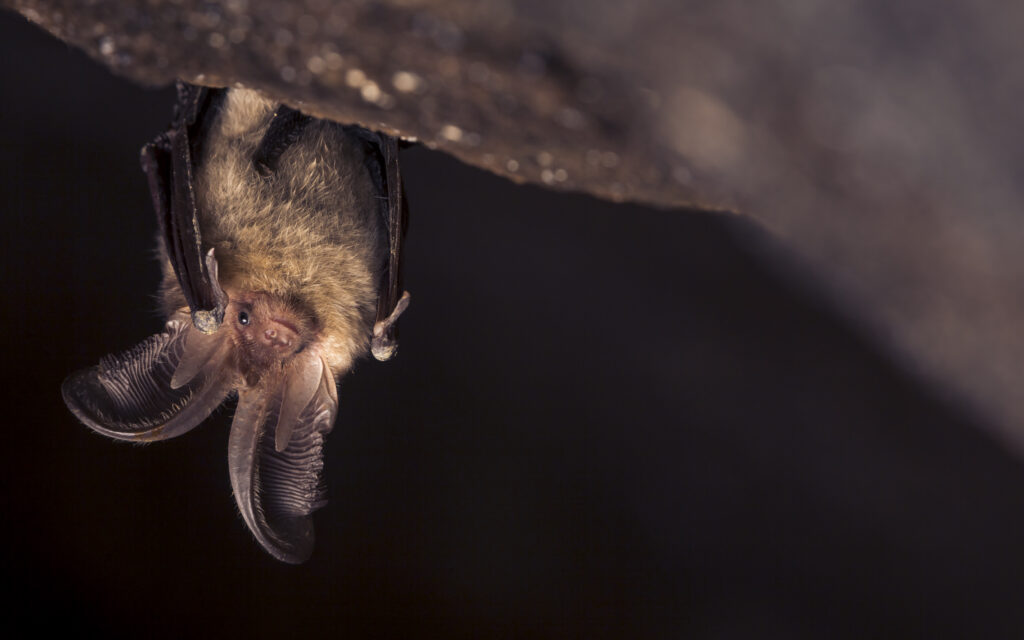
Get to know the world’s only flying mammal
Did you know that bat populations are decreasing throughout Florida? Or that one brown bat can eat up to 1,200 insects per hour? Most insect-eating bat species can eat their body weight in bugs every night – talk about an impressive appetite! Not only that but these highly beneficial creatures are the only true flying mammals. In Florida, we have 13 native bat species, though up to 20 different species have been found. The most commonly spotted bat in Florida is the Brazilian free-tailed bat. Every night, bats fly up to 30 miles from their nests at an altitude between 20 and 50 feet to search for tasty bugs to eat.
Not all bats across the U.S. are protected by the Endangered Species Act, but these wildly misunderstood little critters are important to keep around, even when they’re not a protected species. Here in Florida, bats are protected under Florida Administrative Code rule 68A-4.001. The U.S. Fish & Wildlife Service estimates that bats save the U.S. approximately $1 billion annually on crop damage and pesticide fees. Between eating crop-damaging pests and acting as pollinators and seed distributors, bats are a huge asset that many people might mistakenly classify as a pest.
Now, you might be wondering how a pest control company can praise bats when the prospect of a bat colony moving into your crawl space or attic is less than ideal. Don’t get it twisted – we don’t think you should encourage bat colonies to set up shop in the space where you are also living. While bat guano is an excellent fertilizer, it can be harmful to breathe in the fumes. Bat guano can cause Histoplasmoses due to the fungus spores in the guano. That is the biggest risk bats pose to humans, at least in this part of the world. So please don’t go around opening all your doors and windows in an attempt to be one with nature, that is a very bad idea. The good news is that we can have the best of both worlds when it comes to bats. If you want all the benefits of having a nearby bat population without opening your home to them, we’ve got some tips.
Bat Houses
Try building a bat house in your backyard, far enough away from your home to provide some distance from your potential new neighbors. Despite what Dracula may have you thinking, the bats here in Florida are shy and don’t have any desire to drink your blood or get tangled in your hair. Give them their own space so that they can live safe, happy lives while you do the same! The reason you might see bats more than you used to is because their habitats are being cleared to make way for new, human-driven development. Bats don’t want to hang out with humans, but with their habitats dwindling quickly, they are forced to find new places to live.
Myth: All bats have rabies
Another misconception is that bats are a major culprit in giving people rabies. This is not the case. A very small percentage of bats contract rabies, less than 1% in fact. Not only that, but if a bat does contract rabies, it cannot survive. Rabies result in the bat becoming paralyzed and dying, which is why you should never pick up a bat off the ground. Approximately 10% of bats found on the ground test positive for rabies. The remaining 90% that end up grounded for one reason or another still don’t want to be poked and prodded by humans.
The bats flying around don’t pose the same risk but leave them alone too. Like most wild animals, if a bat is threatened by a person, it may attempt to bite in self-defense. If the bat is injured and you want to help, either call a professional or take appropriate precautions. Children should never pick up a bat, end of story. But, if you are an adult with thick leather or otherwise protective gloves at the ready, you may be able to gently move the bat into a box that you have prepared. The box should have a towel or blanket for the bat to be comfortable and the box should have plenty of air holes. Don’t keep the bat as a pet, that is a very bad idea. The bat should be released into the care of a wildlife professional as soon as possible.
If you do find yourself under the same roof as a bat colony, please follow professional guidelines for bat exclusion. Exclusion must be done between August 15th and April 15th due to the breeding patterns of bats. Our wildlife control team can take care of that for you.
Or if you find an injured bat you want to help, you can check the Florida Bat Conservancy’s list of who to call. Most importantly, please remember to be safe, keeping both your safety and the safety of local bat populations in mind.
This blog was written using resources from University of Florida IFAS (1, 2, 3, 4), the Florida Bat Conservancy, and our in-house wildlife specialists.


